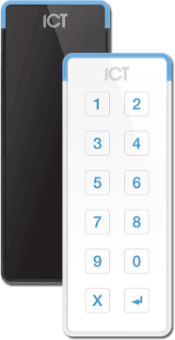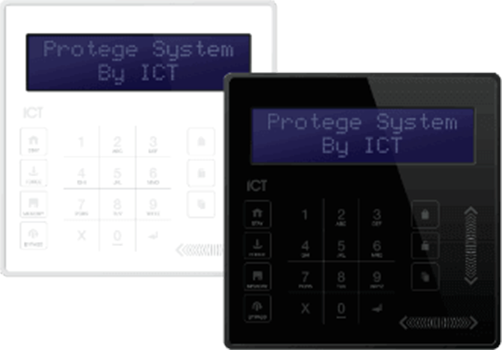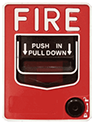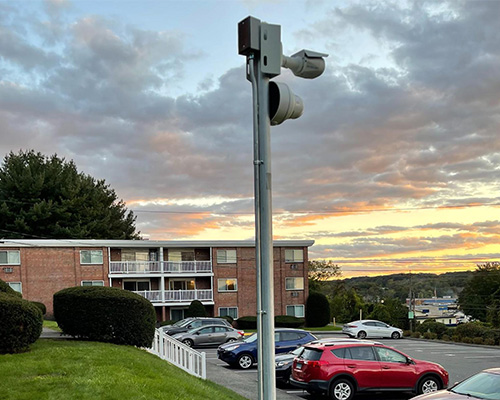Video MGMT System
 Access Control
Access Control
Voice & Data Wiring
 Burglar Alarm
Burglar Alarm
 Fire Alarm
Fire Alarm
Video MGMT System
Voice & Data Wiring
THOUGHT CENTER > Blog > Security Cameras
December 5, 2023
Too busy to read? Here’s a summary:
The balance between the right of property owners to monitor for security purposes and the right of tenants to have privacy is delicate but logical.
Before we jump into the details, here's a little food for thought: according to a survey conducted by the UNC Charlotte Department of Criminal Justice & Criminology, most burglars are discouraged by outdoor cameras, surveillance notifications, and other security infrastructure when choosing homes, buildings, and parking lots to target.
For property managers, this means that installing cameras in strategic and visible locations significantly enhances safety at their properties.
But where exactly can landlords and property managers place cameras, and what placements may run afoul of privacy regulations?
Keep on reading to find out.

Yes. Landlords have the right to install security cameras.
That said, they can't just go around installing them anywhere they want. Tenants also have rights—privacy rights—and those, too, must be respected.
Camera installation is a big yes for common areas in apartment buildings and complexes, such as parking lots, building entrances, amenity rooms, and hallways connecting apartment units. On the other hand, cameras installed inside tenant units and rented homes are likely to violate a tenant’s right to privacy and may constitute harassment or voyeurism.
Several Connecticut laws safeguard an individual's privacy. According to the Connecticut Office of Legislative Research, one privacy law that may apply to landlords and tenants is the state's voyeurism law (CGS § 53a-189a).
The law states that someone commits voyeurism if they maliciously and knowingly capture another person's image without their consent and in situations where the person has a reasonable expectation of privacy.
Disclaimer: The content of this article is intended for informational purposes only and does not constitute legal advice. While we strive to provide accurate and up-to-date information, laws and regulations regarding surveillance camera installation vary by jurisdiction and are subject to change. If you have questions or are uncertain about the legality of installing surveillance cameras in certain areas, consult with an attorney or relevant legal professional.
Here are areas where apartment building landlords are most encouraged to install security cameras:
Main Building Entrance: This is the primary point of access and should always be monitored. It helps track everyone who comes in and out of the building.
Back Doors: Often overlooked, back doors can be potential weak points if not monitored.
Emergency Exits: While these are not frequently used, monitoring them ensures they aren't misused, blocked, or left open.
Elevator Lobbies: A high-resolution or facial recognition camera here can capture faces clearly as people wait to enter elevators.
Stairwells: The less frequently a stairwell is used, the more vulnerable it is to criminal activity.
Entrance and Exit Points: Monitor vehicles as they come and go. Use LPR (License Plate Recognition) cameras to capture license plate digits and store them in a database for seamless parking lot access control and enhanced investigation capabilities.
Elevator Access from Parking Areas: These are critical spots, especially in underground parking areas. People feel much safer in dark or isolated areas when they see security cameras.
Bicycle Racks: With the rise in bicycle thefts, it's a good idea to keep an eye on these areas.
Swimming Pools: Be sure safety protocols are followed and prevent unauthorized access off-hours.
Gyms and Fitness Centers: These areas are prone to theft or misuse during odd hours.
Playgrounds: Install cameras to deter kidnappers and protect children.
Often secluded and visited at odd hours, laundry room cameras discourage theft and other unacceptable behaviors.
With the rise in package thefts, monitoring makes it more likely that residents will receive their parcels.
If your apartment building or complex offers storage solutions, monitor those areas to deter package theft and identify culprits.
Deterrence: As we've already mentioned, a good chunk of burglars will think twice before attempting a break-in if they spot security infrastructure.
Evidence Collection: In the unfortunate event of a crime or lease violation, footage is priceless. It helps law enforcement discover and nab culprits and helps prosecutors convict them and put them away.
Peace of Mind: Knowing there's an extra layer of security provides both landlords and tenants with a sense of safety.
Attracting Tenants: Modern security systems make properties more appealing to potential renters.
Reduced Insurance Premiums: Many insurance companies offer discounts for properties with commercial-grade security systems, especially integrated security systems connected with 24/7 monitoring services.
Tenant Perception: Knowing video surveillance is taking place in common hallways, parking lots, and shared facilities makes tenants feel safer.
Maintenance Monitoring: Landlords use cameras to keep an eye on common areas so that they are well-maintained and free from hazards.
Behavior Monitoring: Residents adhere to property rules and respect the rights of others more conscientiously when cameras are around.
Vehicle Safety: Cameras in parking lots deter car thefts and break-ins. They are also appreciated by tenants who may otherwise feel unsafe, especially late at night.
Property Care: Cameras and surveillance notification signs reduce incidents like graffiti, theft, and misuse of common facilities.
Dispute Resolution: In case of disagreements or claims, camera footage provides unbiased evidence.
Compliance: Security cameras in common areas help property managers make sure their properties adhere to local safety and security regulations.
Transparency is key: Always inform your tenants about the installation of security cameras and avoid using hidden cameras.
Avoid Private Areas: Never install cameras in areas where your tenants have a reasonable expectation of privacy, such as bathrooms and tenant apartment units.
Masking: Ask your installer to activate camera masking features to cover the interiors of units when doors are open automatically and in the camera’s field of view.
Regular Maintenance: Ensure to regularly check and maintain your cameras to keep them in tip-top shape.
Data Protection: If you're recording footage, you've got to make sure it's stored securely.
If you’re a property manager considering camera installation around homes, apartment complexes, or apartment buildings, reach out to our expert team at Mammoth Security. We work with property managers and landlords throughout Connecticut and can guide you through the nitty-gritty of effective, regulation-complaint surveillance.
If you’re interested in security cameras for rental properties, reach out to the Mammoth crew by clicking to contact us and filling out the brief form. We’ll send over a friendly surveillance expert to survey your site, spot your vulnerabilities, answer your questions, and begin developing a surveillance plan that’s compliant with privacy regulations and tailored to the layout and security needs of your property.
Together, let’s protect your tenants and give them peace of mind.
NOT COMPLETELY SURE?
860-748-4292Landlords can indeed install security cameras in public areas like apartment building lobbies, elevators, and common hallways—pretty much any area where residents do not have a reasonable expectation of privacy. However, landlords and property managers do not have the right to install cameras in private units, bathrooms, and other spaces where tenants have a reasonable expectation of privacy. When in doubt, consult with an attorney who is familiar with applicable regulations in your area.
Tenants can install security cameras inside apartment units they’re renting so long as they aren’t violating their lease (for example, gutting walls for cabling) or being perverted about it (for example, installing hidden cameras in bathrooms to spy on visiting guests).
Before installing security cameras on the outside of one’s rented apartment unit or rented home, tenants may need permission from landlords and should be aware that the privacy rights of neighbors may become an issue. In short, while it's generally legal for tenants to use security cameras inside their rented apartment units, it's always a good idea to check with landlords for permission if your installation involves making changes to the property itself (via drilling, tearing out walls, etc.) or placing cameras where they may violate the privacy rights of neighbors.
Property managers should conduct a thorough assessment of their property layout, identify vulnerabilities, and take privacy laws and regulations into consideration before installing security cameras.